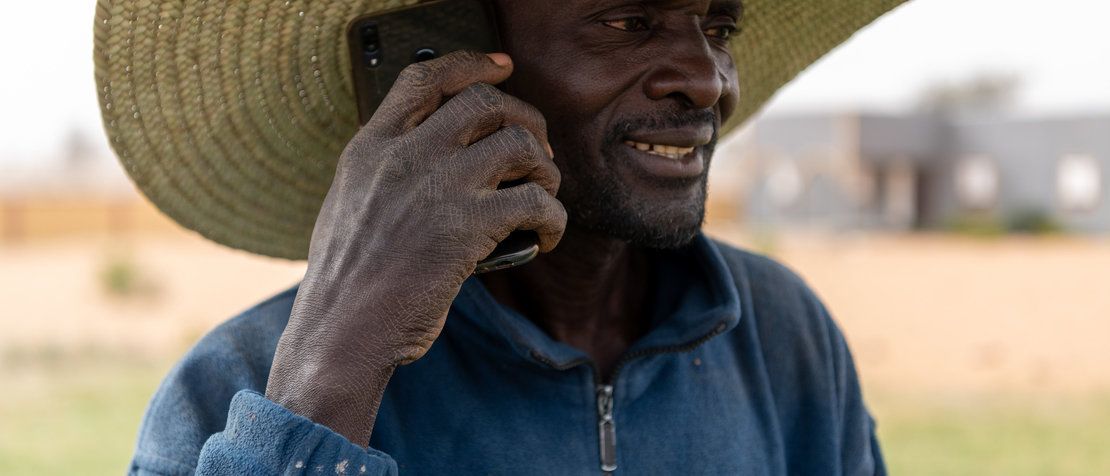
Interactive Voice Response: Delivering life-saving information amid COVID-19 in Niger
“Welcome to the voicemail of the platform for the prevention of coronavirus. To prevent the spread of coronavirus, the Government of Niger and the Ministry of Public Health encourage the population to adopt the following measures.” So begins the message Nigeriens hear after dialling 701 and connecting to the voicemail of the Ministry of Public Health. Available in five national languages – French, Fulfulde, Hausa, Zarma-Songhai and Kanuri – the 701 service provides crucial information about COVID-19 prevention measures and what to do in case of infection.
Since the pandemic first hit Niger in March 2020, around 95,000 citizens have accessed health advice on COVID-19 either through the Interactive Voice Response (IVR) platform, or by receiving text messages on their mobile devices.
The 701 service is free of charge and available throughout the country as part of the Stop Corona Niger IVR campaign.
Raising awareness in remote communities
The breakdown of users by language – Hausa speakers as the largest group, followed by Kanuri, Zarma-Songhai, Fulfulde and French speakers – reflects the campaign’s focus on rural and remote dwellers, who make up more than 81 per cent of Niger’s total population. According to ITU’s World Telecommunication/ICT Indicators Database, only 5.25 per cent of inhabitants of Niger use the Internet.
Rural communities face serious challenges in accessing vital services and information because 2G is the most prevalent mobile telephony service available to them.
Given this context, the 701 service can play a key role in raising awareness and informing citizens not only about COVID-19, but also other life-threatening health issues. The availability of the 701 service in multiple languages already represents an important step in dispelling disinformation and stigma that surrounds diseases in some traditional communities. “Voicemail messages about COVID-19 have helped me a lot to respect the [preventative] measures and have urged me to take the necessary precautions,” explains Abdou Ousseini, a speaker of Houssa. “They are in my mother tongue and therefore I better understand the challenges of the pandemic for myself and my community.”
Another beneficiary, Hamadou Dotty, says: “We are very delighted to hear these awareness messages in the Fulfulde language and are convinced that this 701 hotline has helped more than one Fulani living in rural areas to understand the messages and respect the measures against the COVID-19 pandemic.”
Alzouma Moumouni notes that the messages drew everyone’s attention in his Zarma-speaking community. “As an [state] agent in the field, it is also my duty to encourage such a practice in our underdeveloped countries, in particular Niger, where health coverage is low.” According to Mahamadou Bagourmé, the 701 service has been of great help to his family. “Most strikingly, even my grandchildren used it to master precautions by heart. In my opinion, the line has been a success and has served many of our compatriots.”
Bringing essential social services closer to citizens

“That’s why we came up with this idea of connecting the unconnected, focusing on a citizen-centric and service-delivery approach, to make it in a such way that wherever they are in the country, citizens are at the centre of our approach.”
Designed by ANSI and the Ministry of Public Health, the Stop Corona Niger IVR campaign builds on the Niger 2.0 Smart Villages project and BeHe@lthy BeMobile, two initiatives coordinated by ITU and other United Nations agencies to connect rural dwellers and improve their access to essential social services.
The campaign leverages the public-private partnership model and is being implemented in collaboration with four telecom companies (Airtel, Moov, Niger Telecoms, and Orange), as well as three local digital technology companies (Dev4Smart, Novatech and Visicom).
This holistic and cross-sectoral approach aims to bring the benefits of digital services to all Nigeriens, while demonstrating the importance of partnership with the private sector in achieving sustainable development goals and leaving no one behind.
“Because of COVID-19 we have really seen how important it was to be connected,” notes Guimba-Saidou. “Imagine what the answer to this pandemic would have been had all the villages been connected already. It would have been much easier and efficient for us. We don’t want to lose that opportunity, seizing the moment to scale up and to bring more partners on board.”
Header image: S.Acharya via ITU Flickr
